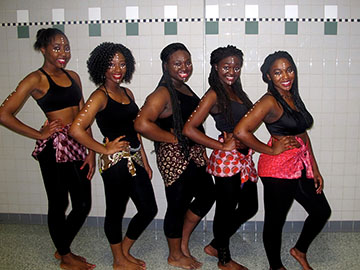
Photo credit: Adaobi Umeaku
Onyinye Ekemezie, 17 years old, moved from Nigeria to Texas in 2013. The only person she knew in Dallas was her mother, who had moved to the U.S. after Onyinye was born. Even her siblings were still in Africa.
“It was so painful,” Onyinye said. “I remember crying; I cried for like a whole day, I was sick for a week, I couldn’t eat and I couldn’t drink the water.”
Onyinye came to L.V. Berkner High School in Richardson scared and shy. She knew she had been blessed by the move to the U.S., but now nothing was familiar to her except for her mom.
A few months later, though, Onyinye was a changed person. She had won the annual Berkner “So You Think You Can Dance” competition with four of her friends by performing a hard-hitting African dance. After sharing a piece of herself and her culture, Onyinye said, she was accepted by her peers. She lost her shyness, she found sisters within her school, and she became a role model for other students.
“It was a blessing, a dream come true,” Onyinye said. “When I first came here I never thought I would be a voice to people.”
Onyinye and her friends’ African dance routine sent a shock wave through the school. As their award for winning the competition, the girls performed again at the school’s pep rally three days later. The crew was met with such a positive reaction there, that they decided in October to form the first and only African dance team in the Richardson Independent School District (RISD).
“After they performed at the pep rally it was like a bomb went off and everybody wanted to be a part of it,” Adaobi Umeaku, dance team sponsor and a chemistry teacher from Nigeria, said. “So that same day and the day after I had like 20 to 30 girls stopping me: ‘Hey how do I become a member? I want to do this, I want to do that.’”
Umeaku, and the four captains of the crew, Onyinye, Cindie Ngomege from Cameroon, and sisters Joann and Evelyn Pearson from Ghana, held tryouts in January. Twenty-five girls auditioned, and 11 made it. The dance crew has given 14 girls a place to feel at home within their high school, and now they refer to each other as sisters.
“I was so excited I screamed twice when I opened the letter and I took a picture of it and sent it to my parents,” Maya Mary-Goe from Cameroon, said.
Over 50 percent of Berkner’s student population is African, African American and Hispanic. The school’s diversity reflects that of its neighborhood in Richardson, said Lauren Brown, director of after school programs for Berkner. Over time, the area has transitioned from predominantly white and Asian families to a very diverse subdivision.
The African students at Berkner, representing a number of countries, didn’t have anything to represent their cultures, Brown said.
“We have other things like Latin dance and hip hop, but nothing to represent their culture, and they really, really wanted to do it,” she said.
The African dance team was established as part of Berkner High School’s Rams’ Open Classes (ROC) program. ROC is a free after school program directed by Brown that allows students to take classes after school that wouldn’t be traditionally offered during school hours such as cooking, Zumba, Latin dance, and now African dance. The ROC program receives government grants that pay for the classes and teachers, and provide students with an after school snack and a late bus that leaves at 6 p.m. Monday through Thursday. The goal is to help keep students out of trouble after school, and encourage passing grades; the girls on the dance team must keep all their grades above a 70 percent in order to participate.
Since the team is sponsored through ROC, the girls don’t have to pay any fees to be a part of the squad, including their uniforms.
“It’s not like the other dance organizations where you pay a lot to be a part of it, they didn’t have to pay a dime to be a part of it,” Umeaku said. “So I told them that the best thing we can do as a group is give back to our community, and one way or another spread love through dance and music.”
Umeaku organized for the girls to perform at The Stewpot, a day shelter in Dallas, as part of Be a Blessing Day, an event where volunteers make care packages of toiletries and food to give to the homeless on Valentine’s day. She also plans to have the girls perform at a battered women’s shelter and an assisted living home.
“When I saw them I knew they don’t have what I have, and that touched me,” Onyinye said. “I was moved and I danced hard. I wanted to make them happy.”
In addition to the non-profit organization performances, the African dance team is scheduled to perform at Afrimma, an African event in Richardson in July. Famous African artists and comedians will be on hand to perform at the red carpet award show, including a few of the girls’ favorite performers like Davido and Iyanya.
African dance is more than a hobby for the girls on the team, and for other African students within the school.
“I think this African dance really changed some girls lives,” Pearson, one of the team captains, said. “Before it they wouldn’t really show off they’re African culture, but now they’re proud. We made some proud Africans.”








